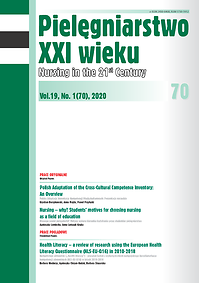Selected moral problems in the practice of pediatric nurses and strategies for solving them
DOI:
https://doi.org/10.2478/pielxxiw-2020-0003Keywords:
moral dilemmas, pediatric nursingAbstract
SELECTED MORAL PROBLEMS IN THE PRACTICE OF PEDIATRIC NURSES AND STRATEGIES FOR SOLVING THEM
Introduction. Research on the nature of moral problems in the work of pediatric nurses and strategies for solving them is significant, among others, for improving vocational education.
Aim. The aim of the study was to examine the opinions of pediatric nurses on the issue of moral problems experienced by them in professional practice and the strategies for solving them.
Material and methods. The research was carried out in a group of 104 pediatric nurses using the method of a survey with the use the authors’ questionnaire.
Results. Half of the nurses surveyed rarely experienced moral problems (55; 52.88%) in their professional work. In solving moral dilemmas, nurses were guided primarily by the voice of their own conscience (64, 61.54%), norms of the code of professional ethics (61, 58.65%) and procedures in force at their place of work (58, 55.77%). In the situation of a moral dilemma, it was important for the respondents to be supported by a departmental nurse (48, 46.15%) and a nurse with longer professional experience (48, 46.15%). The majority of the respondents (90, 86.53%) tried to follow the principles of a professed religion in their professionalwork. Half of the surveyed notice deficiencies in their knowledge. According to more than half of the respondents (70, 67.30%), the knowledge of professional ethics is useful in clinical practice.
Conclusions. The examined pediatric nurses developed strategies for solving problems of a moral nature in their professional practice. Developing moral sensitivity, improving the ability to make ethical decisions and mutual support in nursing teams are important issues to be focused on in the process of postgraduate and lifelong education of nurses.
References
1. Wrońska I. Problemy specyficzne dla zawodów pielęgniarki i położnej. [w:] Marczewski K. (red.). Notatki do ćwiczeń z etyki medycznej. Lublin: Akademia Medyczna w Lublinie; 2003.
2. Szuta W. Wybrane wartości aksjologiczne w etosie pielęgniarki. [w:] Krajewska-Kułak E, Łukaszuk C, Lewko J, Kułak W. (red.), W drodze do brzegu życia, Tom XI. Białystok: 2013, s. 35-47.
3. Wrońska I. Filozoficzne i etyczno – deontologiczne podstawy pracy pielęgniarskiej, w: K. Zahradniczek (red.). Wprowadzenie do pielęgniarstwa. Warszawa: PZWL; 1995.
4. Fry ST, Johnstone MJ. Etyka w praktyce pielęgniarskiej. Zasady podejmowania decyzji etycznych. Lublin: Makmed; 2009.
5. Turkmen AS, Savaser S. Pediatric nurses’ information and applications related to ethical codes. Iran J Pediatr. 2015; 25(1): e321.
6. Bagnasco A, Cadorin L, Barisone M, i wsp. Ethical dimensions of paediatric nursing: A rapid evidence assessment. Nurs Ethics. 2018; 25(1): 11-122.
7. Choe K, Kim J, Yang Y. Pediatric nurses’ ethical difficulties in the bedside care of children. Nurs Ethics. 2019; 26(2): 541-552.
8. Lankau A, Krajewska-Kułak E, Wrońska I. Wpływ przekonań religijnych na ocenę pracy pielęgniarki w percepcji pacjentów. Medycyna Paliatywna. 2015; 7(3): 176-185.
9. Paszkiewicz-Mes E, Głowacka A, Grzanek M, i wsp. Postawy etyczne w opinii pielęgniarek pediatrycznych. Pielęg XXI w. 2016; 1(54): 37-42.
Downloads
Published
Issue
Section
License
Copyright (c) 2020 Authors

This work is licensed under a Creative Commons Attribution-NonCommercial-NoDerivatives 3.0 Unported License.




